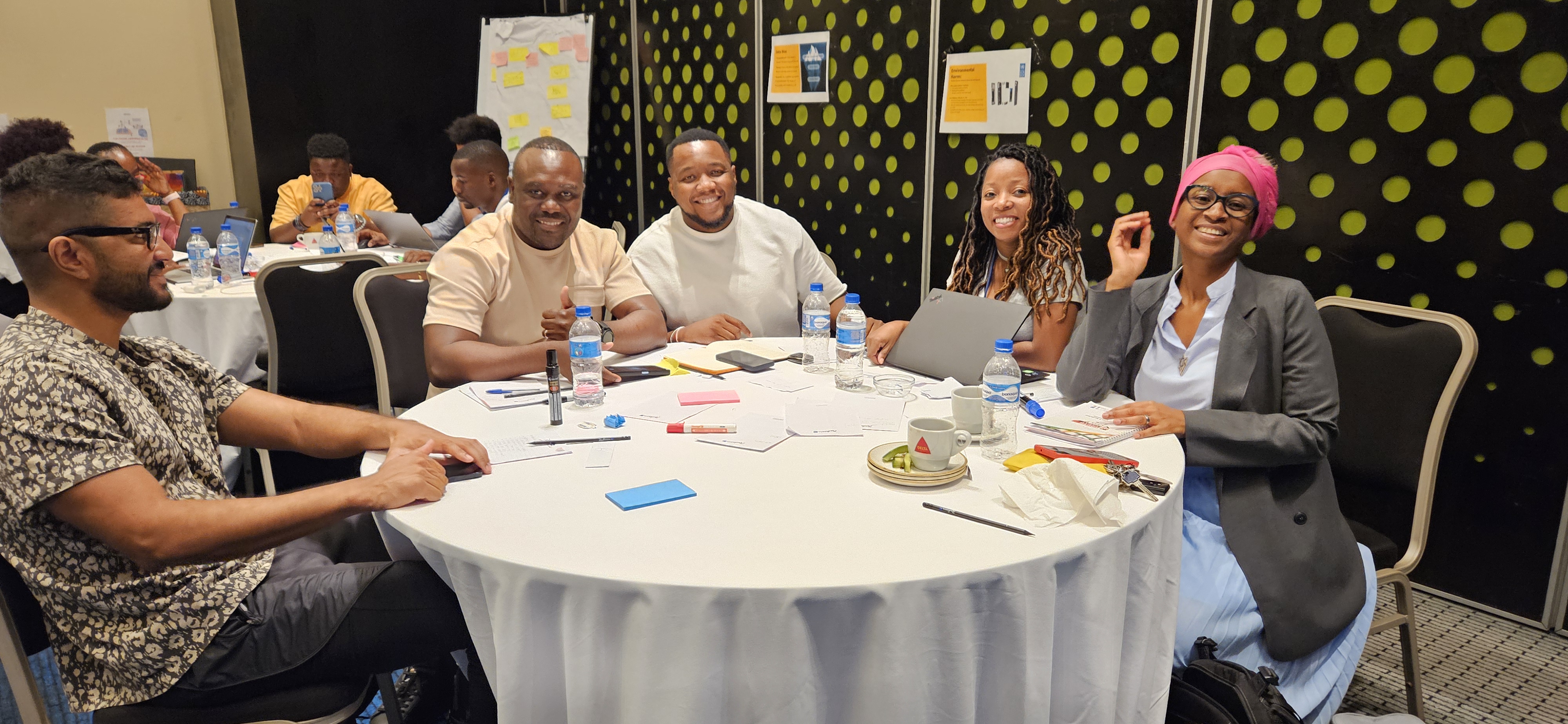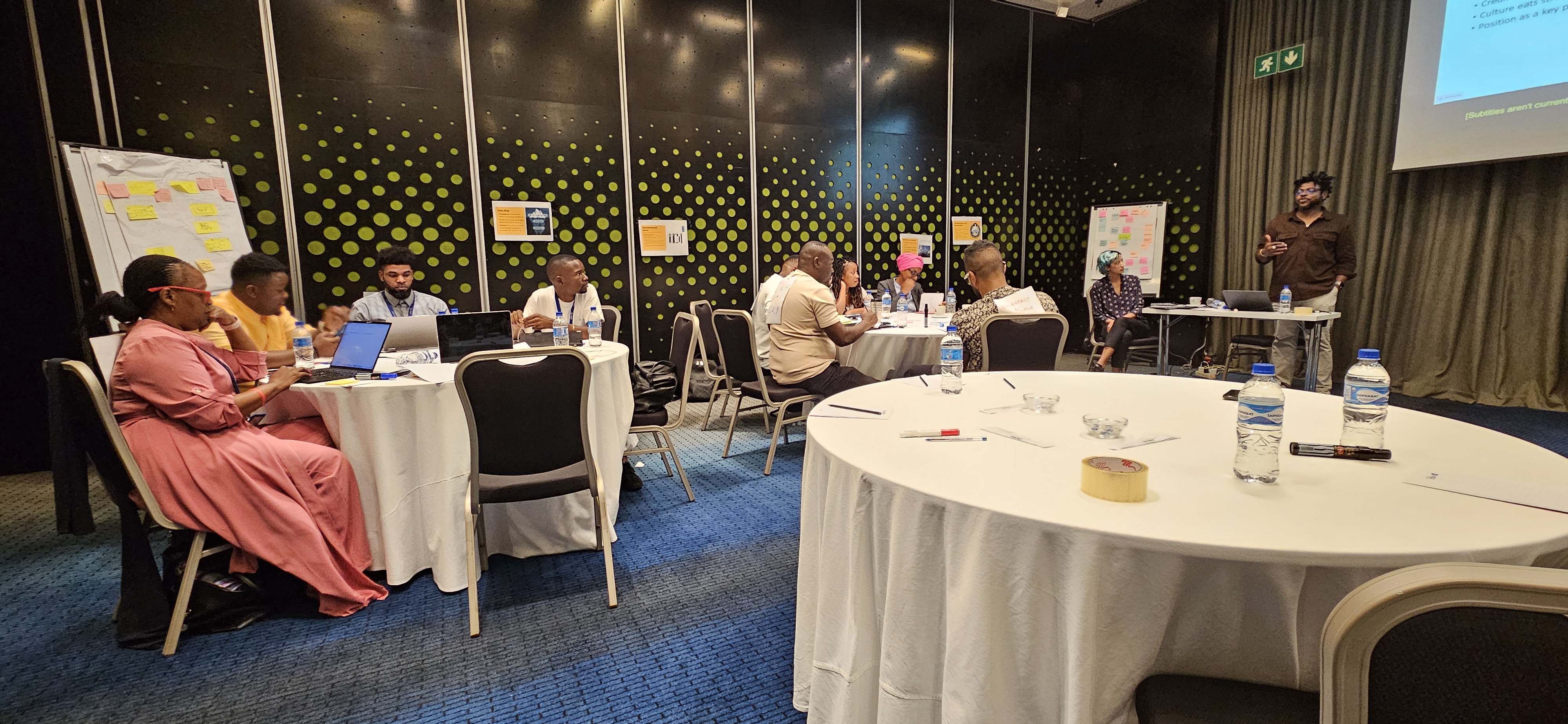Driving Digital Transformation: Introducing the Digital Fitness Programme
April 22, 2024
The DFP stood as pivotal as we achieved a milestone in our journey of digital transformation at the UNDP Mozambique country office. Participating in a unique workshop with the theme “digital fitness”, we charted a new and profound path to leverage technology's potential in tackling urgent developmental challenges to catalyze meaningful results.

Author: Alexandra Antunes, head of Solutions Mapping | Co-Author: Mario Chilundo, Head of Experimentation
Co-Author: Julieta Massango, Head of Exploration
The Journey Begins:
Before diving into actual design of the workshop and its sessions, we gathered for a half-hour chat to set the stage for the digital fitness week. This initial meeting served as an opportunity to align objectives, set expectations, and foster a collaborative spirit among participants. In addition, we were keen to ensure that we define problems that are aligned with our CO’s priorities, namely, i. Climate and conflict resilience; ii. Employment for youth and Women and iii. Public service delivery with a focus on resilient health systems, noting that all these have a cross-cutting with digitalization and innovation, Gender, and Governance.
With those priorities in mind, we constituted three small groups of 5 to 6 people, drawn from programmatic and operational units, and each of the groups worked throughout the week to solve the same development challenge, guided by the two Chief Digital Office (CDO) facilitators from HQs, Nithima Ducrocq and Nonso Jideofor.

Day 1: Mapping the Landscape
The first day of the workshop commenced with Module 1 of the Digital Fitness Program (DFP), focusing on Systems Mapping, Problem Identification, and Ideation. We all delved into this, mapping, crafted problem statements, and explored solutions through ideation exercises.
In this session, the teams also identified three problematic or developmental challenges that they wanted to address, using the ‘How Might We’ methodology. It was important to understand the system in the manner described below:
“How might we enhance the accessibility of essential/public services for vulnerable communities across provinces, districts, and municipalities in Mozambique, considering the constraints of scarce local resources, wavering political dedication, and unclear jurisdictional boundaries.”
"How Might we increase the oversight and Monitoring of policies and regulations for youth and woman in Mozambique to be more empowered and employed."
"How Might we ensure the sustainability of a Healthcare management system to reduce the impact of the public health issues in Mozambique?"

Day 2: Designing for Impact
The CDO team then introduced the essential UNDP Digital standards, starting with user needs to bridging the digital divide and ensuring ethical considerations. Through this, we gained insights into designing solutions and /or interventions that make a meaningful impact.


Day 3: Prototyping and Testing
Next, we shifted the focus to Prototyping and Testing Solutions, emphasizing the importance of iterative development and user feedback. We learned about rapid prototyping, the value of avoiding unnecessary complexity, and the benefits of open-source solutions.

Day 4: Creating and Launching
As the workshop progressed, we explored the intricacies of Creating and Launching digital initiatives. The three teams started to measure digital effectiveness of the solutions created projecting what should be required to have a successful digital team, keeping in mind data principles, and planning for long-term sustainability.
Day 5: Reflecting and Moving Forward
On the final day of the workshop, we tried to synthesize what we learnt and embarked on preparing for the journey ahead. It was an opportunity for reflection, and also to receive feedback from the facilitators to inform future endeavors, which proved very valuable.

As a take-away, the workshop design prompted us to reflect on the principles outlined by Donella Meadows in her work "Dance with Systems," of which I'd like to share three that seem particularly relevant given the insights we gained during the week.
“Get the Beat! Before making any changes, take the time to observe and understand the system's behavior thoroughly.”
“Listen to the Wisdom of the System! Respect the existing structures and dynamics within the system that contribute to its functionality. Avoid unnecessarily disrupting its self-maintenance capacities.”
“Go for the Good of the Whole! Prioritize actions that enhance the system's overall properties, such as resilience, diversity, and sustainability. Avoid optimizing individual parts at the expense of the entire system.”
Looking Ahead:
At the core of this initiative lies the recognition of digital technology as the driving force for positive change. The UNDP Digital Strategy 2022-2025 envisions a world where digital tools empower individuals and communities, aligning closely with our mandate to support countries in achieving structural transformation, leaving no one behind, and building resilience.
The strategy outlines three key objectives:
Amplifying UNDP's Programming Work: By leveraging digital solutions, we can enhance the impact and reach of our development interventions, making them more efficient and effective.
Strengthening Inclusive Digital Ecosystems: Through collaborative efforts, we aim to foster environments where digital technologies are accessible and beneficial to all, particularly marginalized groups.
Transforming UNDP into a Digitally Native Organization: To remain relevant in the digital age, UNDP must equip itself with the necessary skills, processes, and data to lead the way in digital transformation.
The introduction of the Digital Fitness Program to the Mozambique country office represents a pivotal moment in our journey towards digital transformation. This program, supported by the Accelerator Lab and the Digital Regional Office, was designed to enhance our organization's digital capabilities, and drive impactful change across both operational and programmatic fronts. It did exactly that.
“How might we enhance the accessibility of essential/public services for vulnerable communities across provinces, districts, and municipalities in Mozambique, considering the constraints of scarce local resources, wavering political dedication, and unclear jurisdictional boundaries.” "How Might we increase the oversight and Monitoring of policies and regulations for youth and woman in Mozambique to be more empowered and employed." "How Might we ensure the sustainability of a Healthcare management system to reduce the impact of the public health issues in Mozambique?"


 Locations
Locations